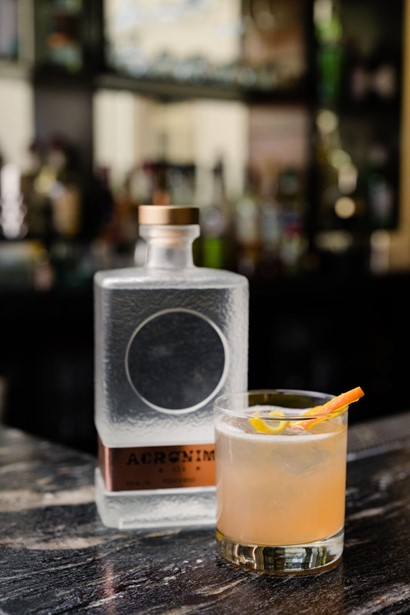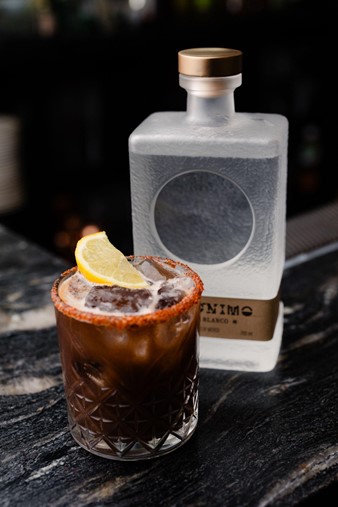Distilled vs Compound Gin: What’s the Difference?

You are not alone if you have ever stood in front of a gin shelf at your neighborhood liquor store feeling momentarily perplexed about what is what. Among the most often asked questions is whether distilled rather than compound gin is better.
To what use do these words refer? Do they change the taste? And which one should you really purchase? Let us deconstruct it free from jargon and understand distilled vs compound gin.
Table of Contents
What is Distilled Gin?
Redistilling neutral alcohol with natural botanicals, including juniper, coriander, angelica root, citrus peel, and other herbs and spices, results in distilled gin.
Either hung above the spirit in the still or soaked in the spirit, these botanicals The vapors transport those botanical tastes and smells after the combination is cooked, therefore producing a smooth, aromatic, and more balanced gin.
Distinctive character and complexity often come from distilled types since the ingredients are essentially baked into the gin.
Most excellent gin brands follow this path. Labeling is also more strictly regulated; if it reads “distilled gin,” it must have been produced using the correct technique, free of any artificial flavorings following distillation.
Particularly fond of this approach are craft distillers since it lets them play with unusual plant combinations while yet maintaining the gin purity.
Distilled is most likely what you’re searching for if you’re the kind that likes consuming spirits neat or wants your gin to shine in a martini.
What is Compound Gin?
Now compound gin approaches things entirely differently. This gin is produced by just adding flavors, natural or synthetic, directly to the neutral alcohol rather than undergoing a second distillation.
Many entry-level gins fit this category since it is faster, simpler, and less expensive to manufacture.
The truth, though, is not all compound gins are harmful. Particularly in cocktails, some are made with actual botanicals and taste quite delicious.
On the other hand, if inexpensive flavoring chemicals are employed, some can come across as too harsh, too sweet, or even unnatural. The flavor may not blend as smoothly or feel as smooth since the procedure omits distillation.
Compound gin presents one difficulty in terms of transparency. Many brands do not make clear whether their product is distilled or compound, so marketing may be deceptive.
If you value quality, then reading the label and doing a little search will help.
Which Should You Select?
It can be difficult to choose between distilled vs compound gin. Your taste and the purpose you’re utilizing it for truly determine this.
A distilled gin would probably provide a smoother, more balanced taste if you’re looking for a sipping gin or something for a classic G&T or martini. The taste usually is more rounded and sophisticated.
Conversely, if you’re making cocktails where the gin isn’t the major emphasis—say a bramble or a fruity gin punch—a good-quality compound gin might work very well.
It’s cheap, and in a mixed drink the subdued rough edges most likely won’t show.
Having said this, not every compound gin is made equal. While some companies cut corners, others employ high-grade botanicals and are quite concerned about flavor.
It could be worth searching elsewhere if the price appears too good to be true and the label lacks specifics.
Quick Snapshot Comparison
To help you better understand distilled versus compound gin, here is a quick comparison:
- Distilled gin calls for actual botanicals during redistillation. Usually more expensive, it tends to be smoother and more fragrant.
- Gin Compound: Chemical
Made by adding flavoring straight to alcohol instead of distilling once more. Though quality varies, it is faster and less expensive to make.
Why This Matters to Fans of Gin
Knowing how your gin is manufactured helps you to regulate what you drink. It’s about flavor, experience, and quality as much as money. The argument between distilled and compound gin is personal as much as technical.
Distilled gin is most likely your taste if you enjoy subtlety and depth. Compound gin might be perfect, though, if your main concerns are blending and ease. Most fans of gin do not distinguish between distilled vs compound gin.
Every month, more and more businesses are emerging with a distinctive spin. Knowing the manufacturing process enables you to ignore the flashy branding and base more wise decisions
depending on your tastes.

FAQs
- Distilled and compound gin differ mostly from one another in which regard?
The technique is where the main distinction resides. While compound gin is flavored without another distillation, distilled gin is produced by redistilling alcohol with botanicals.
- Distilled vs compound gin which is better?
Not exactly, although distilled gins are a better option generally since they usually utilize fewer synthetic elements.
- How can I find out if I’m getting a distilled gin?
Check the label; if it states “distilled gin,” that is encouraging. Certain companies additionally stress the distillation technique in their advertising.
- Might compound gin be of good quality?
Yes, but the brand will determine this. While some eschew synthetic tastes and employ actual botanicals, others do not. There is great variation in quality.
- For a cocktail, which is better?
Both can be used, although if gin is the main ingredient in a drink, distilled gin is typically recommended. When other flavors rule mixed drinks, compound gin can be fantastic.
Conclusion
You now have distilled rather than compound gin, clearly stated in basic terms. There is a place for both kinds in the gin universe. Most fans do not distinguish between distilled vs compound gin.
While compound gin offers quick, easily available choices for daily drinks, distilled gin delivers elegance, balance, and quality.
If you’re just starting out with gin, try both and find what works. You could find surprising your preferences. After all, gin is about discovering new tastes; whether it’s distilled or compound, there is a gin with your name on it.
